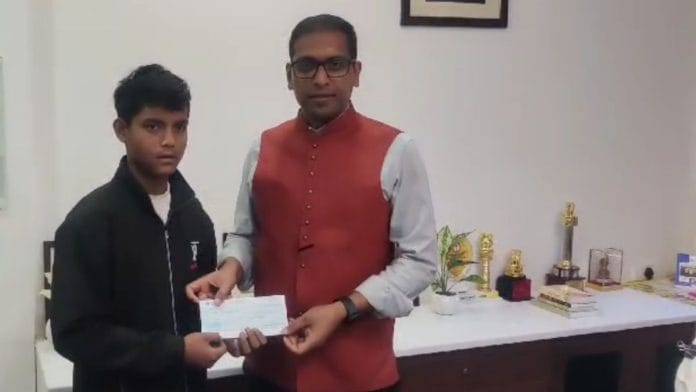Bhopal: To make Indore free of beggars, the district administration has announced a monetary reward of Rs 1,000 for anyone who informs the authorities about any person indulging in begging in India’s cleanest city.
This follows the decision of Indore District Collector Asheesh Singh to invoke Section 163 (1) (2) of the Bharatiya Nagarik Suraksha Sanhita (BNSS)—which gives magistrates the power to issue immediate preventive orders in urgent situations—to ban begging in the city. According to the order issued 2 January, not only beggars but also those found giving alms or purchasing items from beggars would be booked.
The order issued by Singh states, “If anyone is found giving alms to beggars or purchasing any items from them, then the said person will also be punished as a violation of this order.”
The district administration has appointed Dinesh Mishra from the Women and Child Development department to oversee the initiative. Residents of Indore can call Mishra to report individuals found begging on the streets. Once the information is verified and established as true, the caller will receive a reward of Rs 1,000. Under the initiative, the district administration has identified 50 people who were found begging on the streets in the past seven days.
“We have so far given a reward of Rs 1,000 to six people, and another 10 will be receiving theirs in the next two days. However, the remaining 34 individuals, whose information proved accurate, have refused the rewards, saying they made the call as part of their social obligation. Most of those seeking rewards are young college students,” Mishra told ThePrint.
The initiative to make Indore beggar-free was launched in February 2024 after a woman caught begging with a child was found in possession of Rs 2.5 lakh. With a three-pronged approach involving counselling, rescue and legal action, a year-long campaign was rolled out by Singh.
The first phase, in which those found begging were counselled, was carried out between February and August. Eight teams of five members each were deployed at major hotspots where begging was prevalent. These teams would trace those begging, take their belongings, visit their places of residence, and counsel them and their family members to seek alternative sources of livelihood.
According to Mishra, over 3,500 people were counselled in the past six months to give up begging. This was followed by the rescue phase. Despite counselling, if individuals were still found begging, they were sent to Seva Dham, where they were provided with food, medical treatment and an assessment of their qualifications or eligibility for enrolment in social welfare schemes designed for the poor and marginalised.
“We collected data on over 450 such individuals and are working to enrol them in various schemes, whether for Mukhyamantri Ladli Bahna Yojana, Mukhyamantri Kalyani Pension Yojana or others. However, the portal to add more beneficiaries under Ladli Bahna is currently closed, so we are waiting,” Mishra said.
“We have also partnered with various NGOs that work on creating livelihood opportunities for those found begging. So far, 45 children have been placed in child care facilities, and another 354 individuals have been sent to the Seva Dham ashram,” he added.
In the third and final step, the administration is preparing to take legal action against individuals found begging and those giving alms. “We have identified five people against whom an FIR for violating Section 163 will be registered soon,” Mishra said.
Waseem Iqbal, director of NGO AAs, called for a holistic approach to check the prevalence of begging.
“The issue of begging is prevalent not only because people beg, but also because people give, believing it to be a noble act. However, addressing this challenge solely through FIRs is insufficient. Instead, government rehabilitation centres and linkages to government schemes need to be made more robust,” he told ThePrint.
Begging is an issue related to psychology and the development of self-esteem, said Iqbal, who has been working with Indore-based NGO Childline India Foundation for over a decade as well. “To truly stop begging, this self-esteem needs to be rebuilt. Unfortunately, none of the rehabilitation centres today provide facilities for psychological counselling.”
He added that the government needs to create role models of individuals who have given up begging and achieved a better life. “Rather than penalising people, they should be motivated to abandon begging.”
Another challenge, according to Waseem, is that government skilling schemes for marginalised people often focus on areas with very limited demand. “The government, as part of skilling initiatives, might train them to make agarbattis (incense sticks), but there is hardly any market value for such products.”
He added that these efforts often fail, and people return to begging. “There needs to be better government infrastructure and a re-evaluation of these schemes.”
(Edited by Radifah Kabir)
Also Read: A Bandhavgarh elephant calf strayed 50 km after deaths of herd members. Rescued, but ‘refusing food’






